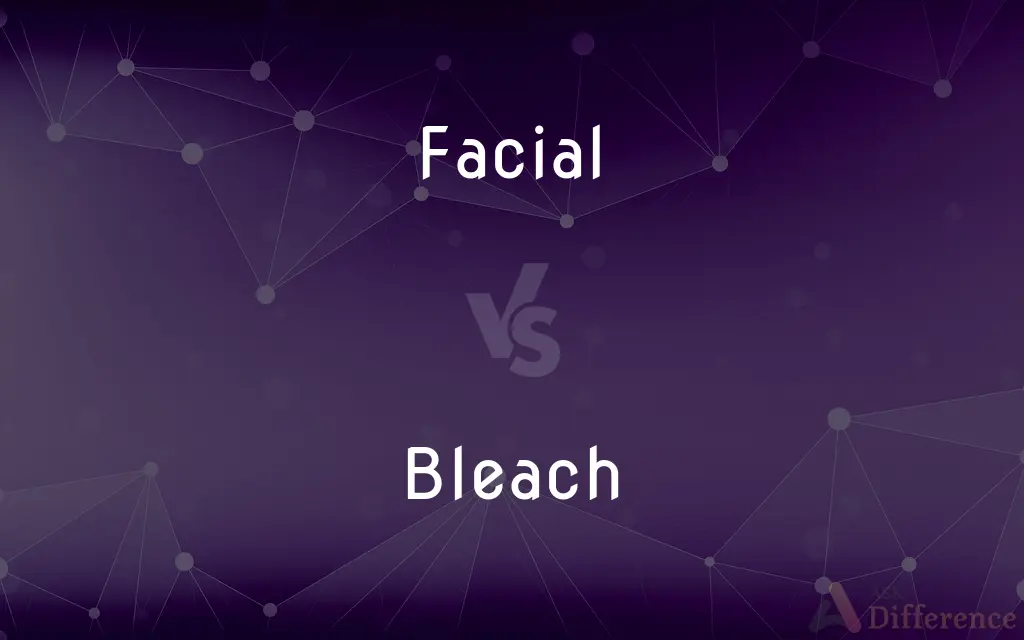Facial vs. Bleach — What's the Difference?
By Tayyaba Rehman — Updated on September 20, 2023
A facial is a skin treatment for the face, while bleach is a chemical used to lighten or whiten surfaces, including hair and skin.

Difference Between Facial and Bleach
Table of Contents
ADVERTISEMENT
Key Differences
A facial refers to a multi-step skin treatment specifically targeted for the face. Facials often involve cleansing, exfoliating, extracting, massaging, and moisturizing to rejuvenate and maintain the skin's health. They are sought after for relaxation, anti-aging benefits, and tackling specific skin issues. On the contrary, bleach encompasses chemicals used for lightening or whitening. In the beauty industry, bleach is often used to lighten hair, remove hair color, or lighten skin complexion.
While facials are associated with pampering and improving skin health, bleach's primary role, especially in the context of beauty, is to alter color. People often use bleach for aesthetic reasons, wanting to change their hair color or achieve a certain look. Facials, on the other hand, are about nurturing the skin, providing both short-term radiance and long-term benefits.
The application of bleach can be a singular act, designed to achieve immediate visible results, such as when lightening hair. Facials, however, are typically considered a regular maintenance routine. It's not uncommon for individuals to schedule monthly or quarterly facials to ensure their skin remains in optimal condition.
In summation, while both facials and bleach can be tools in one's beauty regimen, they serve very different purposes. A facial is an all-encompassing treatment aimed at bettering skin health and appearance, while bleach focuses on color modification.
Comparison Chart
Primary Use
Skin treatment for the face
Lightening or whitening surfaces
ADVERTISEMENT
Application
Multi-step procedure
Can be a singular act
Purpose
Improve skin health and appearance
Alter color
Frequency
Often regular (monthly, quarterly)
As needed
Main Components
Cleansers, exfoliants, masks, moisturizers
Chemical agents like hydrogen peroxide or chlorine
Compare with Definitions
Facial
A regimen involving multiple steps to rejuvenate the face.
The esthetician recommended a hydrating facial.
Bleach
A cosmetic product to lighten hair or skin.
She applied bleach to achieve a golden hair tone.
Facial
A beauty treatment for the face.
She booked a facial at the local spa.
Bleach
A substance that removes color or stains.
The bleach removed the wine stain from the shirt.
Facial
A procedure to cleanse and improve the skin's condition.
His skin felt refreshed after the facial.
Bleach
A strong oxidizing agent.
Bleach can be harmful if not used properly.
Facial
A treatment primarily for relaxation and skin nourishment.
She felt relaxed during her facial.
Bleach
Bleach is the generic name for any chemical product that is used industrially and domestically to remove color from a fabric or fiber or to clean or to remove stains in a process called bleaching. It often refers, specifically, to a dilute solution of sodium hypochlorite, also called "liquid bleach".
Facial
A facial is a family of skin care treatments for the face, including steam, exfoliation (physical and chemical), extraction, creams, lotions, facial masks, peels, and massage. They are normally performed in beauty salons, but are also a common spa treatment.
Bleach
To remove the color from, as by means of chemical agents or sunlight
Over time, the exposure to sunlight bleached the rug in front of the window.
Facial
Of or affecting the face
Facial expressions
Bleach
To make white or colorless
Dawn bleached the mountains.
Facial
A beauty treatment for the face
The offer includes a facial, make-up, and manicure
Bleach
To whiten by causing the death or expulsion of algal symbionts from (coral).
Facial
Of or concerning the face
Facial cosmetics.
Facial hair.
Bleach
To act as or use a bleach.
Facial
A treatment for the face, usually consisting of a massage and the application of cosmetic creams.
Bleach
To become white as a result of the loss of algal symbionts, usually following an environmental stress such as increased water temperature. Used of coral.
Facial
(relational) Of or affecting the face.
Bleach
A chemical agent used for bleaching.
Facial
Concerned with or used in improving the appearance of the face.
Bleach
The act of bleaching.
Facial
On its face; as it appears applied]].
The facial constitutionality of the law is in question.
Bleach
The degree of bleaching obtained.
Facial
(medicine) A personal care beauty treatment which involves cleansing and moisturizing of the human face.
Bleach
(archaic) Pale; bleak.
Facial
(film) A kind of early silent film focusing on the facial expressions of the actor.
Bleach
(transitive) To treat with bleach, especially so as to whiten (fabric, paper, etc.) or lighten (hair).
Facial
A foul play which involves one player hitting another in the face.
Bleach
(intransitive) To be whitened or lightened (by the sun, for example).
Facial
A sex act of male ejaculation onto another person's face.
Chuck gave his co-star a creamy facial.
Bleach
To lose color due to stress-induced expulsion of symbiotic unicellular algae.
Once coral bleaching begins, corals tend to continue to bleach even if the stressor is removed.
Facial
Of or pertaining to the face; as, the facial artery, vein, or nerve.
Bleach
To make meaningless; to divest of meaning; to make empty.
Semantically bleached words that have become illocutionary particles
Facial
Cranial nerve that supplies facial muscles
Bleach
(uncountable) A chemical, such as sodium hypochlorite or hydrogen peroxide, or a preparation of such a chemical, used for disinfecting or whitening.
Facial
Care for the face that usually involves cleansing and massage and the application of cosmetic creams
Bleach
(countable) A variety of bleach.
Facial
Of or concerning the face;
A facial massage
Facial hair
Facial expression
Bleach
An act of bleaching; exposure to the sun.
Facial
Of or pertaining to the outside surface of an object
Bleach
A disease of the skin.
Facial
A therapeutic skin care treatment.
The facial helped reduce her acne.
Bleach
To make white, or whiter; to remove the color, or stains, from; to blanch; to whiten.
The destruction of the coloring matters attached to the bodies to be bleached is effected either by the action of the air and light, of chlorine, or of sulphurous acid.
Immortal liberty, whose look sublimeHath bleached the tyrant's cheek in every varying clime.
Bleach
To grow white or lose color; to whiten.
Bleach
The whiteness that results from removing the color from something;
A complete bleach usually requires several applications
Bleach
An agent that makes things white or colorless
Bleach
The act of whitening something by bleaching it (exposing it to sunlight or using a chemical bleaching agent)
Bleach
Remove color from;
The sun bleached the red shirt
Bleach
Make whiter or lighter;
Bleach the laundry
Bleach
A chemical used to lighten or whiten.
She used bleach to lighten her hair.
Bleach
An agent that disinfects or sterilizes.
The bleach killed the germs on the surface.
Common Curiosities
How often should one get a facial?
It varies, but many recommend once a month.
Is bleach safe for all hair types?
Not always, it's crucial to consider hair health and type.
Is a facial only for women?
No, facials are for anyone, regardless of gender.
Can bleach be used during a facial?
Yes, some facials may involve a mild bleaching step, but it's not common.
Is bleach natural?
While there are natural lightening agents, many commercial bleaches are synthetic.
What should I expect after a facial?
Skin might be red or sensitive, but should feel refreshed.
Can bleach be used on colored clothes?
Typically, bleach is used on whites, but there are color-safe bleaches available.
Can a facial help with acne?
Yes, specific facials target acne and blemishes.
Can bleach be harmful?
Yes, if not used correctly or if it contacts sensitive areas, it can be harmful.
How long does a facial take?
Generally, 45 minutes to an hour.
How should bleach be stored?
In a cool, dry place, out of children's reach.
Can using bleach too often damage hair?
Yes, excessive bleaching can weaken and damage hair.
Is it safe to do a facial at home?
Yes, with the right products and techniques.
Are there different types of facials?
Yes, ranging from hydrating to anti-aging or acne-treating.
Why do some people bleach their skin?
Some believe it enhances their beauty or addresses hyperpigmentation.
Share Your Discovery

Previous Comparison
Encystment vs. Excystment
Next Comparison
Stopwatch vs. ChronographAuthor Spotlight
Written by
Tayyaba RehmanTayyaba Rehman is a distinguished writer, currently serving as a primary contributor to askdifference.com. As a researcher in semantics and etymology, Tayyaba's passion for the complexity of languages and their distinctions has found a perfect home on the platform. Tayyaba delves into the intricacies of language, distinguishing between commonly confused words and phrases, thereby providing clarity for readers worldwide.
















































